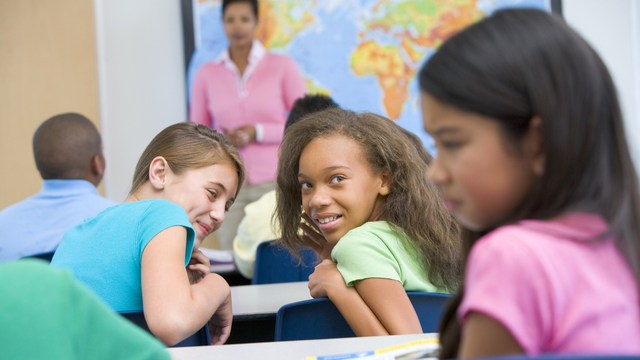 MonkeyBusiness Images/PhotoSpin
MonkeyBusiness Images/PhotoSpin
Despite widespread anti-bullying campaigns in schools, there is still no 100 percent effective way yet to prevent bullying and its devastating consequences.
A recent study in the journal Pediatrics found that bullying can have harmful long-term effects on children’s mental and physical health.
The study looked at over 4,000 children in a long-term study, checking up with them in fifth, seventh and tenth grade to see how they fared.
Results showed that children who experienced bullying both in the past and present had the worst outcomes, including greater symptoms of depression and lower self-worth.
Children who only currently were being bullied had the second worst outcomes, followed by children who were only bullied in the past. Children with the best outcomes were those who were never bullied.
On a scale of psychosocial health, 44.6 percent of children with past and present bullying experiences scored at the lowest end, compared to only 6.5 percent of children who hadn’t experienced bullying.
An article on the study in the New England Journal of Medicine states that the authors of the study concluded early intervention is important to prevent long-term bullying, as well as follow-up interventions if needed. Clinicians could also initiate mental health referrals at the first sign of bullying.
Lynn Lyons, co-author of “Anxious Kids, Anxious Parents: 7 Ways to Stop the Worry Cycle and Raise Courageous and Independent Children,” said in an email that bullying can increase the risk for depression, since it can get in the way of social and peer support for children.
“Long-term bullying often results in kids pulling away from social activities and school,” Lyons said.
“Kids gain confidence and improve social skills by practicing, trying and failing, having good experiences and bad,” she added. “When you’re the target of bullying, you’re not going to take those risks.”
However, if bullying is short-term, there is more of a chance for children to feel positive about steps taken to stop the bullying, especially if it’s reinforced that it’s resolved.
The government website Stopbullying.gov states that bullying victims can also experience anxiety, loneliness, sadness, sleep and eating pattern changes, and loss of interest in previously enjoyable activities.
So can bullying have any positive effects on children?
“Some might argue that it makes kids more resilient or tougher, but the cost is high,” Lyons said. “Children who are bullied sometimes join with other rejected peers and then become bullies themselves, hoping to connect or fit in in some way.”
“Are they tougher?” she added. “Maybe, but only because they are looking for a way to protect themselves.”
She believes that the most effective anti-bullying campaigns are those that have a focus on the bystander approach.
“Bullies react to peer pressure, so when kids stand up for other kids, the bully often backs off,” Lyons said. “When a child is bullied, but feels the support of his peers, he feels less isolated, more connected, and better able to cope with the behavior of the bully.”
She said schools should also keep track of at-risk children, which could include children that are perceived as “different” by their peers.
“Mental health referrals are important if the child is becoming depressed, anxious, or isolated,” Lyons said.
Although there have been more publicized cases in the media of suicide due to bullying, Lyon believes that suicide is a rarer side effect than depression.
Here are two more ways bullying prevention can be implemented:
1) “Supporting a child’s peer relationships, in and out of school if needed, should be the focus of the interventions. No matter what adults say to a target of bullying, action counts. A child needs to experience connection as a way to negate the bully’s power.”
2) “Parent education helps, with a focus on teaching all parents and kids to support a bystander approach. Parents should be talking to their children about how to support peers when they witness bullying. Most kids are bystanders, not the bully or the victim, and can be a valuable asset in schools. Most bullying does not happen in front of adults, so kids need training.”
One teacher featured on The Today Show uses a unique strategy to help identify and monitor children who are at risk for bullying. She hands out index cards to students and tells them to write the names of other kids they want to know, and also to “nominate an exceptional classmate.” This is done by secret ballot.
In this way, the teacher figures out which kids aren’t “belonging” as much as others, and she keeps an eye on them.
Sources:
Pediatrics. Bogart, Laura, et al. Peer Victimization in Fifth Grade and Health in Tenth Grade. Web. March 6, 2014.
http://pediatrics.aappublications.org/content/early/2014/02/11/peds.2013-3510.abstract
Lyons, Lynn. Email interview. March 6, 2014.
http://www.lynnlyonsnh.com/?page_id=6
NEJM Journal Watch. Young, Kelly. Persistent Childhood Bullying Associated with Poor Health Outcomes. Web. March 6, 2014.
http://www.jwatch.org/fw108487/2014/02/18/persistent-childhood-bullying-associated-with-poor-health?query=etoc_jwpeds
Stopbullying.gov. Effects of Bullying. Web. March 6, 2014.
http://www.stopbullying.gov/at-risk/effects
Flam, Lisa. TODAY. Mom shares teacher’s ‘brilliant’ secret for fighting bullying, easing loneliness. Web. March 6, 2014.
http://www.today.com/moms/mom-shares-teachers-brilliant-secret-fighting-bullying-easing-loneliness-2D79322114
Reviewed March 6, 2014
by Michele Blacksberg RN
Edited by Jody Smith




Add a CommentComments
There are no comments yet. Be the first one and get the conversation started!